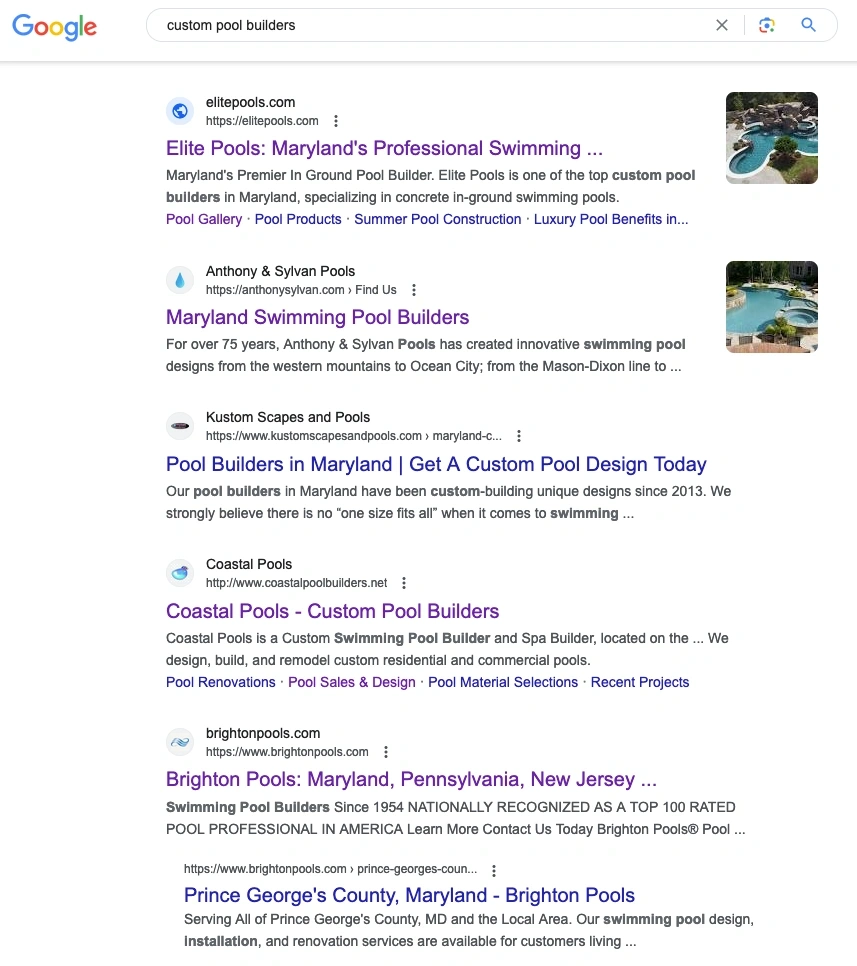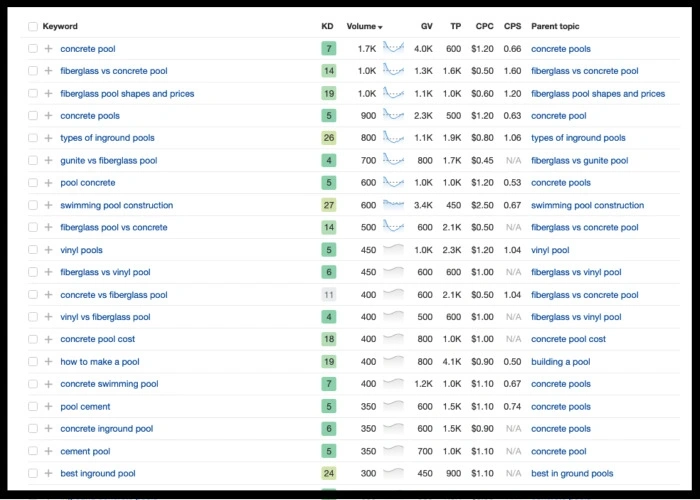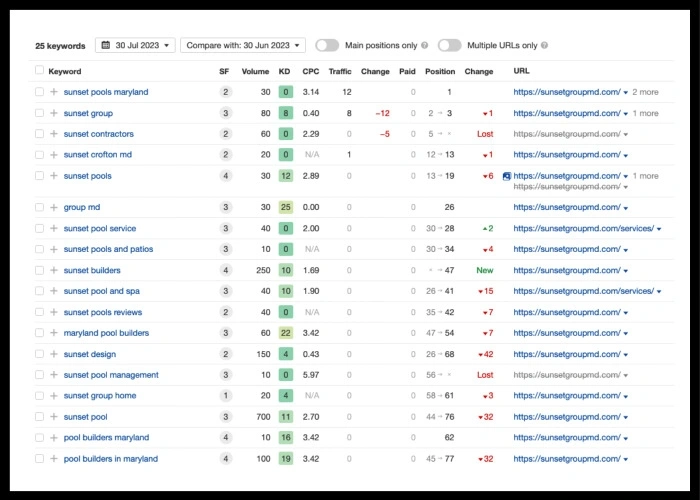Keyword Research for Swimming Pool Companies: The Key to Attracting More Pool Building Leads

- by Kester Browne
Aug 4, 2023
Keyword research for swimming pool companies.
It's the compass that points you toward what your potential customers are searching for and the net that catches them when they do.
In this blog post, we will dive into the critical role that keyword research plays in improving your online visibility, attracting high-quality leads, and propelling your pool-building business to new heights.

So, whether you're just dipping your toes into SEO for pool builders or looking to refine your current digital marketing strategies, this guide to keyword research will make a splash.
Let's dive right in!
What Are Keywords?
Keywords are the words and phrases that internet users type into a search engine when looking for information, services, or products - basically, anything online. They are the queries that guide the search engine to relevant web pages.

Types of Keywords
Head Keywords: These are usually single-word keywords with a high search volume and increased competition. For example, "pools."
Long-tail Keywords are usually three or more word phrases specific to what you're selling. They have lower search volumes but could be more competitive. For instance, "Customized concrete pools in Florida."
Local Keywords: These keywords are crucial for businesses with a physical location or cater to a specific geographic area, like 'pool builders near me.'
Why are Keywords Important in SEO for Pool Companies?
The right keywords act as the bridge between your potential customers and your pool company.
They're crucial in leading searchers to your website, boosting your visibility on search engines, and ultimately increasing your chances of attracting more leads.
SEO is, in essence, a game of keywords.
By strategically placing these 'keys' in your content, you unlock the potential to rank higher in search engine results, allowing your pool-building business to make a big splash in the digital arena.
Keywords help with:
Relevance: Keywords help search engines understand what your content is about. When your keywords align with what users are searching for, search engines rank your site higher on the search results page.
Visibility: Using keywords your target audience is searching for makes your website more visible to the right people - those interested in your services and more likely to become customers.
Competition: Knowing what keywords your competitors are ranking for can help you refine your SEO strategy.
Keywords are the lighthouses guiding your potential customers to your website. The following section will examine how this impacts your pool-building business.
The Impact of Keyword Research on Your Pool Business
Understanding the strategic role of keywords is just the beginning. It's time to dive into how impactful keyword research can be on your pool-building business.
Let's see how.
#1. Navigating the Online Market
Pool builders operate in a highly competitive market, both offline and online. With keyword research, you can better understand your potential customers' search habits and trends. You discover exactly what terms they use when looking for pool-building services, enabling you to tailor your content and marketing efforts to match these queries.

#2. Attracting Quality Traffic
Effective keyword research doesn't just increase the quantity of your website traffic; it enhances the quality too. By targeting specific, relevant keywords, you can attract visitors who are genuinely interested in your services and are more likely to convert into leads.
#3. Outranking Competitors
Uncovering the right keywords is akin to finding hidden treasure in the digital ocean. It's an opportunity to identify less competitive, niche keywords that your competitors might have overlooked. By targeting these 'low-hanging fruits,' you can achieve better search rankings and gain a competitive edge.
#4. Improving Website Content and User Experience
With insights from your keyword research, you can create more focused and valuable content that aligns with your audience's needs and search habits. Plus, integrating these keywords strategically can make your website more navigable and user-friendly, offering a better overall user experience.
#5. Increasing Conversions and Revenues
When you rank for the right keywords, you attract the right audience; when you attract the right audience, you increase the chances of conversions. More conversions, in turn, mean more clients for your pool-building business and, ultimately, higher revenues.
A Step-by-Step Guide to Conducting Keyword Research for Pool Builders
Now that we have established the vital role of keyword research in SEO for your pool-building business, let's take a deep dive into the step-by-step process of finding the best keyword for your pool company.
Step 1: Understand Your Niche
Start by defining your niche in the pool-building industry. Do you specialize in residential or commercial pools? Do you offer unique designs or specific services? Understanding your niche will help you brainstorm initial keyword ideas.
Step 2: Brainstorm Initial Keyword Ideas
Brainstorm a list of potential keywords based on your niche and your services. Think about the queries your potential customers might use. For example, 'commercial pool builders', 'residential pool designs,' 'custom pool construction,' etc.
Step 3: Use Keyword Research Tools
Utilize keyword research tools like Google Keyword Planner, SEMrush, or Ahrefs to refine your list and discover new keyword opportunities.

These tools can provide valuable data like search volume, keyword difficulty, and more.
Step 4: Analyze Keyword Relevance and Search Intent
Not all keywords with high search volumes are beneficial. Analyze the relevance of each keyword to your business and consider the search intent behind it. Are searchers looking for information, or are they ready to hire a pool builder?
Step 5: Consider Long-Tail Keywords
Don't overlook long-tail keywords. While they might have lower search volumes, they often attract more targeted and high-converting traffic. For example, 'best residential pool builder in Miami.'
Step 6: Check Out Your Competitors
Look at the keywords your competitors are ranking for.

You might discover new keyword ideas or realize you must prioritize specific keywords in your strategy.
Step 7: Consider Local SEO
As a pool builder, your services are likely location-specific. Hence, local keywords, like 'pool builders in [your location],' should be a significant part of your keyword strategy.

This will help you attract customers in your geographic area.
Step 8: Prioritize Your Keywords
Based on the data from your research, prioritize your keywords. Consider factors like search volume, relevance, competition, and current ranking status.
Step 9: Implement Keywords Strategically
Incorporate your chosen keywords into your website content, blog posts, meta descriptions, and more. Remember, search engines frown upon keyword stuffing - use your keywords naturally and strategically.
Step 10: Monitor Keyword Performance
Use SEO tracking tools to monitor your keyword performance regularly. SEO is not a one-time activity. As market trends and search algorithms evolve, you must constantly assess and adjust your keyword strategy.
Integrating Keywords into Your Website and Content: SEO Best Practices
Incorporating keywords into your website and content is an art form. It's not just about stuffing them everywhere possible; you must strategically place them for optimal results. Below are some SEO best practices to ensure that your well-researched keywords enhance your website's visibility and ranking.
Page Title Tags and Meta Descriptions
These are vital SEO elements that appear in search engine results.

Ensure your target keywords are present in your title tags and meta descriptions, but always ensure it reads naturally and entices users to click on your page.
URLs
Include your target keywords in your URL. This helps search engines, and users understand the content of the page. For instance, www.yoursite.com/residential-pool-builders-miami-fl is both keyword-rich and descriptive.
Headings and Subheadings (H1, H2, H3)
Use your keywords in your page and blog post headings and subheadings. These are places where search engines look to determine what your content is about. Plus, it improves readability for your users.
Image Alt Text
Search engines can't 'see' images but can read the alt text. Including keywords in your image alt text can help boost your SEO performance and make your website more accessible to people using screen readers.

In the Content
Naturally, integrate your keywords into your website content, blog posts, and articles. However, avoid 'keyword stuffing.' Your content should always be readable and valuable to your audience.
Internal and External Links
When linking internally or externally, try incorporating your keywords into the anchor text. However, always ensure it fits naturally and adds value to the reader. For example this anchor text, "customer profiles for swimming pool marketing," is an internal link.
Local Business Listings
For local SEO, list your business in directories like Google My Business, Yelp and Patch, and use your keywords in the business description.
Remember, while keywords are crucial for SEO, they should never compromise the user experience. Keep your content relevant, valuable, and engaging. Search engines reward sites that offer quality content and a great user experience.
Tracking SEO Success: How to Measure and Adjust Your Strategies
Even the most meticulously crafted SEO strategy is only as good as its results. Measuring your SEO success is crucial for understanding whether your tactics work or need adjustments. It provides invaluable insights into your website's performance and audience behavior.
Let's explore some key metrics to monitor and tools to use when tracking your SEO efforts for your pool-building business.
Organic Traffic - One of the most straightforward indicators of SEO success, is an increase in organic traffic — the number of visitors coming to your site from unpaid search results. Tools like Google Analytics provide comprehensive reports on your website's organic traffic.
Keyword Rankings - Monitoring how your chosen keywords rank on search engines gives you insights into your SEO efforts' effectiveness. Tools like SEMrush, Moz, or Ahrefs allow you to track your keyword rankings over time.
Bounce Rate - This metric represents the percentage of visitors who navigate away from your site after viewing only one page. A high bounce rate might indicate your site, or content isn't meeting users' expectations or needs.
Conversion Rates - Are visitors to your site taking desired actions, such as filling out a contact form or requesting a quote? If not, you might need to reassess your keywords or your site's user experience.
Backlinks - The number and quality of other sites linking to your website significantly impact your SEO. Tools like Moz's Link Explorer can help you monitor your backlink profile.
Page Loading Speed - Page loading speed influences your website's ranking on search engines and affects user experience. Use tools like Google's PageSpeed Insights to monitor your site's loading speed.
Local SEO Rankings - For pool builders, local SEO is critical. Tools like White Spark local rank tracker or Moz Local can help monitor your local rankings.
Tracking these metrics will help you understand whether your SEO strategies are working or need adjustment. SEO is a long-term game; it requires patience and constant fine-tuning. But, with meticulous tracking and adjustments, you'll see your website climb the rankings, leading to more visibility, leads, and business growth.
Conclusion
As we conclude our deep dive into the world of SEO for pool builders, one thing is clear: mastering keyword research is essential to surfacing your business online and making a splash in your market.
With the right keywords, you can optimize your website and content, attract more visitors, convert leads, and see significant growth in your business.
However, it's important to remember that SEO is a marathon, not a sprint.
It involves consistent effort, regular fine-tuning, and continuous learning.
But with patience and persistence, you can turn your website into a powerful tool that works round-the-clock to bring in more leads and revenue for your pool-building business.
As we mentioned, SEO can seem like a deep, vast ocean.
But remember, you're not alone in this journey. SEO experts, tools, and resources are available to guide you, help you navigate the waves, and ensure you're swimming in the right direction.
Ready to dive deeper into SEO and start attracting more leads?
Contact me today for a free SEO consultation tailored explicitly for your pool-building business.
Let's make your business the talk of the town!

About the author
With over half a decade of hands-on experience, I've honed my skills to become an SEO specialist. My passion for increasing my client's online visibility and cash flow, matches my clients' drive to create the best swimming pools. Leveraging cutting-edge SEO strategies, I've catapulted businesses to the top of search engine results, leading to increased leads, conversions, and revenue.
